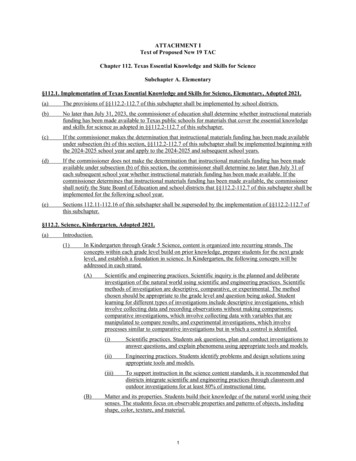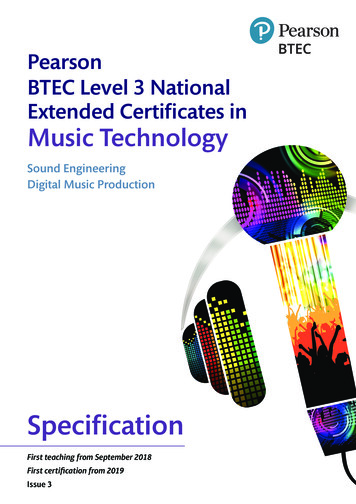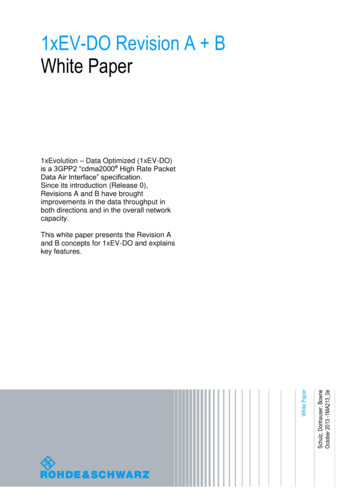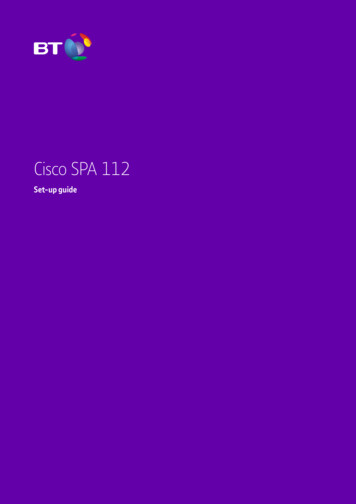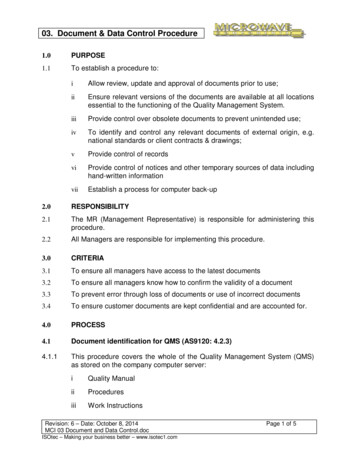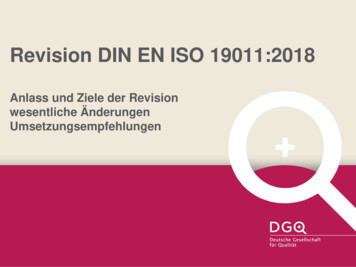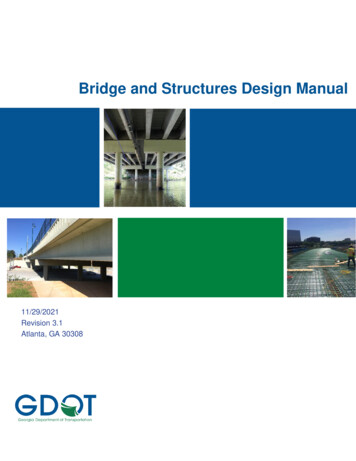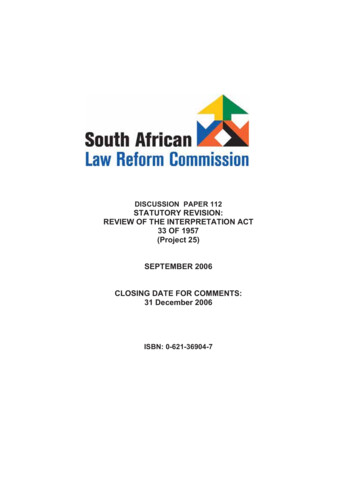
Transcription
DISCUSSION PAPER 112STATUTORY REVISION:REVIEW OF THE INTERPRETATION ACT33 OF 1957(Project 25)SEPTEMBER 2006CLOSING DATE FOR COMMENTS:31 December 2006ISBN: 0-621-36904-7
(ii)
(iii)IntroductionThe South African Law Reform Commission was established by the South AfricanLaw Reform Commission Act, 1973 (Act 19 of 1973).The members of the Commission are –Madam Justice Y Mokgoro (Chairperson)Advocate JJ Gauntlett SCMr Justice CT HowieMadam Justice L MailulaProfessor IP Maithufi (Full-time member)Ms Z SeedatMr Justice W SeritiThe Acting Secretary is Mr Michael Palumbo. The Commission’s offices are on the12th Floor, Sanlam Centre, corner of Andries and Schoeman Streets, Pretoria.Correspondence should be addressed to:The SecretarySouth African Law CommissionPrivate Bag X668PRETORIA0001Telephone:(012) 392-9550Fax:0866 863 971 or (012) 320 w.doj.gov.za/salrc/index.htmThe researcher responsible for the investigation is Mr Pierre van Wyk.The Commission wishes to express its appreciation to the following persons andagencies for their involvement in this investigation – Professor Cora Hoexter of the School of Law of the University of theWitwatersrand who served as the project leader of this investigationuntil December 2004; the Deutsche Technische Zusammenarbeit (German Agency forTechnical Co-operation (“GTZ”)) for its technical and financialassistance in this investigation, and particularly its representativesClaudia Lange and Dr Lothar Jahn; Mr Gerrit Grove, a legal consultant of Pretoria who was commissionedby the GTZ for the drafting of the Bill; and Prof Christo Botha, Head of the Department of Public Law at theUniversity of Pretoria, who was commissioned by the GTZ to assist inthe investigation.
(iv)
(v)PrefaceThis Paper has been prepared to elicit responses and to serve as basis for theCommission’s further deliberations. It contains the Commission’s preliminaryrecommendations. The views, conclusions and recommendations which followshould not be regarded as the Commission’s final views.The Paper (which includes draft legislation) is published in full so as to providepersons and bodies wishing to comment with sufficient background information toenable them to place focused submissions before the Commission. A summary ofpreliminary recommendations and questions for comment appear on pages(vii) – (xvi). The proposed draft legislation is contained in Annexure A on pages467 – 498 of this Paper.The Commission will assume that respondents agree to the Commission quotingfrom or referring to comments and attributing comments to respondents, unlessrepresentations are marked confidential. Respondents should be aware that theCommission may in any event be required to release information contained inrepresentations under the Promotion of Access to Information Act 2 of 2000.Respondents are requested to submit written comment and representations to theCommission by 31 December 2006 at the address appearing on the previous page.Comment can be sent by post or fax, but comments sent by e-mail in electronicformat are preferable.This Discussion Paper is available on the Internet at www.doj.gov.za/salrc/index.htm.Any enquires should be addressed to the Secretary of the Commission or theresearcher allocated to the project, Mr Pierre van Wyk. Contact particulars appear onthe previous page.
(vi)
(vii)PRELIMINARY RECOMMENDATIONS AND QUESTIONS FOR COMMENT1.The Commission has been mandated with the task of revising the SouthAfrican statute book for constitutionality, redundancy and obsolescence. One of theActs to be revised is the Interpretation Act 33 of 1957. The Interpretation Act whichwas drafted during an era of parliamentary sovereignty, is in line neither with thecurrent constitutional dispensation nor with the principles and practices of draftingand interpretation which the legislature and the courts have adopted since 1994 (par1.1 and 1.2).2.In other jurisdictions a review of the relevant interpretation statute has beencombined with the drawing of a drafting manual to set down uniform standards fordrafting of new legislation. The drawing of a drafting manual to set down uniformstandards for drafting of new legislation is beyond the ambit of our brief and would bea very time-consuming exercise. Furthermore, there is a South African draftingmanual, compiled by the office of the Chief State Law Advisor. It is considered thatthe problem is not so much the lack of a uniform drafting manual, but rather theavailability of the manual to drafters at all levels of government (par 1. 21 and 1.28).3.It is proposed that the new interpretation Act be named the “Interpretation ofLegislation Act”. The term “legislation” is preferred over “statutes” to avoid confusion.The Act will govern principles relating to all types and categories of legislation. It isalso proposed that a general long title be included in line with present draftingpractice (par 2.3 and 2.4).4.It is proposed that a preamble be included in the Bill (par 2.8).5.Two lists of definitions are included in the Bill, namely one which defines inChapter 1 of the Bill terms or words used in the Bill and the second in Chapter 4 ofthe Bill which defines words or expressions which occurs in any legislation (par 2.14).6.Section 2 of the Interpretation Act provides that “[t]he following words andexpressions shall, unless the context otherwise requires or unless in the case of anylaw it is otherwise provided therein, have the meanings hereby assigned to themrespectively . . .“. It is proposed that the introductory wording to the definitionprovision should be as follows, namely “in this Act, unless inconsistent with thecontext or clearly inappropriate . . . means . . .” (par 2.15 and 2.17)7.The following definitions are included in the Bill: assigned legislation, duty,extrinsic information, function, intrinsic information, legislation, national legislation,
(viii)old order legislation, organ of state, original legislation, power, previous Constitution,provincial legislation, provision, subordinate legislation (par 2.17.1 – 2.17.17).8.The purpose provision of the Bill makes it clear that its purpose is to align theinterpretation of legislation with constitutional supremacy as envisioned by theConstitution, to facilitate the interpretation and understanding of legislation, and topromote uniformity in the use of language in legislation (par 2.25).9.The proposed Interpretation of Legislation Bill should apply to theinterpretation of all legislation, ie to existing legislation as well as legislation to beenacted in future. If a provision of the proposed Bill is inconsistent with any specificlegislation, that provision must, to the extent of the inconsistency, be disregarded inthe interpretation of that legislation. If a provision of the Bill is excluded from applyingto any specific legislation, that provision must, to the extent of its exclusion, bedisregarded in the interpretation of that legislation. There are also a substantialnumber of statutes that refer to the present Interpretation Act. Consequentialamendments need to be effected to existing statutes that refer to the InterpretationAct. These amendments are reflected in the Schedule to the Bill (on page 493 inAnnexure A of this paper). Existing legislation needs to be scrutinized to ensure aproper application of the proposed Interpretation of Legislation Bill. In some instancesit will be obvious that the proposed provisions of the Bill need to apply to existingprovisions, such as those provisions which refer to the tabling, approval and theeffect of disapproval of regulations as provided for by the present Interpretation Act.The corresponding new provisions of the Interpretation of Legislation Bill on thetransfer of legislation, powers and functions by the President to other Cabinetmembers clearly also need to apply to existing legislation and consequentialamendments need to be effected to those statutes. In other instances the questionwill arise whether the new provisions should apply with qualifications since there isexisting legislation which provides that person has the meaning assigned to it by theInterpretation Act (par 2.34 – 2.35 and also 3.262 – 3.263).10.How does the Bill deal with the supremacy of the Constitution? Wheninterpreting legislation the supremacy of the Constitution is paramount, the spirit,purport and objects of the Bill of Rights in Chapter 2 of the Constitution must bepromoted, and any reasonable interpretation that is consistent with the Constitutionmust be preferred over any alternative interpretation that is inconsistent with theConstitution (par 2.49).11.When interpreting legislation the meaning of a provision in that legislation
(ix)must be determined by its language and its context in the legislation read as a whole.Any reasonable interpretation of a provision that is consistent with the purpose andscope of that legislation must be preferred over any alternative interpretation of thatprovision that is inconsistent with the purpose and scope of that legislation. Theconstituent parts of a provision to be taken into account in determining the meaningof legislation are – the short or long title of the legislation, the enacting statement, thepreamble, the table of contents, any of the segments into which the text of thelegislation is divided, a segment heading, a schedule or annexure to the legislation,or any distinct part of or phrase contained in any of the constituent parts, but not anymarginal note, foot note, end note, information statement, memorandum or anyexplanatory or other information published in or together with the text of legislation. Aprovision in assigned or subordinate legislation must be interpreted also in thecontext of its enabling legislation (par 2.69).12.How should legislation be interpreted in the light of changing circumstances?The Bill provides that enactments apply to circumstances as they arise in accordancewith the contemporary meaning of its language as this will enable the courts to takeaccount of changing circumstances in interpreting the law. However, this should onlyapply as far as the purpose and scope of the legislation permits (par 2.81).13.In the event of any inconsistency in the same legislation between a long title,enacting statement, preamble, table of contents, segment heading, schedule orannexure in any legislation and any other provision of that legislation, that otherprovision prevails (par 2.88).14.Extrinsic information is defined in the Bill as meaning any reports,submissions, comments or any other information which sheds light on thebackground to, or the purpose or scope of, legislation. Extrinsic information may betaken into account when interpreting legislation but only as an opinion on theinformation it conveys and for the purpose of establishing the background to, or thepurpose or scope of, the legislation or any of its provisions, if such background,purpose or scope cannot be established from the text of the legislation or provision,to resolve any ambiguity or obscurity in the legislation or provision, if the ambiguity orobscurity cannot be resolved from the text of the legislation or provision, or to confirmthe meaning of the legislation or provision (par 2.198).15.Existing common-law presumptions and maxims should not be codified,because a codification could lead to more unnecessary rigidity in statutoryinterpretation. The courts and other interpreters may still rely on these common-law
(x)maxims and presumptions, insofar as they are not in conflict with the values of theConstitution (par 2.207).16.A general provision explaining the commencement or coming into force oflegislation is needed. The Bill defines the meaning of commencement provision. TheBill also sets out the position where commencement of legislation is subject tocommencement provisions, where commencement of legislation is not subject tocommencement provisions and where different commencement dates are set fordifferent provisions (par 3.17).17.How does legislation apply before its commencement? A power or dutycontained in any legislation that has been published may be exercised or carried outbefore the commencement of that legislation but only insofar as the exercise of thepower or the carrying out of the duty is necessary to bring that legislation into effect.In addition, nothing done should take effect before the commencement of thelegislation in terms of which it was done (par 3.26).18.The Bill deals with publication of legislation as a precondition for itsenforcement, publication of legislation in the Gazette, and alternative manner ofpublication (par 3.35).19.Parliamentary scrutiny of subordinate legislation is a collateral issue to thisinvestigation. In July 2006 the Department of Justice and Constitutional Developmentrequested that this issue in particular be considered as part of this investigation.Parliamentary scrutiny of subordinate legislation is not presently regulated by therules of Parliament. Interim measures will probably be implemented in theforeseeable future by Parliament to regulate this. A provision has therefore beendrafted to make provisions for the submission of subordinate legislation to Parliamentand provincial legislatures based on the present position. The Commission invitescomment on parliamentary scrutiny of subordinate legislation and submission ofsubordinate legislation to Parliament (par 3.117).20.The Commission also invites comment in particular on whether respondentshave views on the way in which different versions of Bills as they pass through theparliamentary stages are numbered in South Africa (par 3.143).21.Amendment and repeal are defined in the Bill. The Bill also sets out thecircumstances when legislation is regarded as having been repealed, the effect ofrepeal and replacement of legislation, the effect of repeal of enabling legislation onassigned or subordinate legislation, the effect of repeal or amendment of legislation
(xi)on references in other legislation and that amendment becomes part of the legislationthat is amended (par 3.163).22.The Department for Justice and Constitutional Development requested theCommission to consider the issue of sunsetting of subordinate legislation as part ofthis investigation. The question arises how sunsetting of subordinate legislationshould be regulated and whether a separate statute should be adopted for thispurpose, as was done in the Australian States and also by the CommonwealthParliament. The latter adopted the Legislative Instruments Act in 2003. TheCommission invites respondents to comment on the issue of sunsetting ofsubordinate legislation in particular (par 3.186).23.Comment is invited in particular on the question whether there is a need toinclude a provision in the Bill dealing with the issue of prospective or retrospectiveapplication of legislation (par 3.191).24.A distinction should be made between old order legislation and legislationenacted after 28 April 1994. Old order legislation should not bind the state except tothe extent that the legislation expressly or by implication indicates that the state isbound. Legislation enacted after 28 April 1994 should bind the state except to theextent that it cannot be applied to the state or its application to the state is clearlyinappropriate, its application to the state may impede the state in the exercise of itsstatutory functions, or the legislation expressly or by implication indicates that thestate is not bound. Assigned or subordinate legislation should not bind the stateunless the enabling legislation in terms of which that assigned or subordinatelegislation was enacted binds the state or indicates that that assigned or subordinatelegislation binds the state. State is defined to include organs of state and persons inthe service of organs of state acting in their official capacity (par 3.260 and 3.264).The Australian Law Reform Commission considered that much of the confusion intheir existing law stems from the principle that the executive may be bound by an Actby implication in the absence of express words to that effect. They considered thatany exceptions to their proposed new rule that the executive be bound by statuteshould be provided for expressly and not by implication. The Commission invitescomment in particular on its proposed provision in view of the comments made inAustralia on this issue (par 3.261).25.Section 10(1) of the Interpretation Act provides that when a law confers apower or imposes a duty then, unless the contrary intention appears, the power maybe exercised and the duty shall be performed from time to time as occasion requires.
(xii)Section 10(1) is vague and should be clarified. Undoubtedly the bodies andfunctionaries in whom these powers and duties are vested should know when and inwhat circumstances these powers may be exercised and these duties must beperformed. The provisions governing the exercise of statutory powers and dutiesshould be included in the Interpretation Act. This would be pragmatically the sensibleoption although the preferable option would be to deal with this issue in thePromotion of Administrative Justice Act and the Interpretation Act. It is consideredthat gaps might be created if the current Interpretation Act were to be repealed in theexpectation that the PAJA will be amended (par 4.82 – 4.83).26.A provision is included in the Bill which would change the common lawposition in regard to repeal (revocation) or amendment of a decision. (This provisionhas, however, been questioned.) In terms of the proposed provision, wherelegislation confers a power or imposes a duty, that legislation must be read asimplying that any decision taken in the exercise of the power or the performance ofthe duty may be reconsidered and either be confirmed, altered or repealed by theperson on whom the power is conferred or the duty is imposed or either by thatperson or the person who took the decision, if the decision was taken by anotherperson in terms of a power or duty delegated to that other person. It is proposedfurther that a decision may be altered or repealed with effect from a date determinedby the person altering or repealing the decision, which may be a date before, on orafter the decision to alter or repeal was taken. If the person to whom a decisionrelates has been notified, the decision may not be altered or repealed if the alterationor repeal will detract from any rights that have accrued or any legitimate expectationsthat have arisen as a result of the decision, but this should not apply if the affectedperson agrees in writing to the alteration or repeal of the decision, the decision wasprocured by fraudulent, dishonest or any other illegal means or the decision is forother reason invalid. Finally, the following decisions may not be altered or repealed,namely a decision which is the subject of internal or administrative appealproceedings, alternative dispute resolution proceedings, or judicial proceedings, or adecision taken to decide an internal or administrative appeal (par 4.97 and 4.98).Comment received on this provision suggests that it would be very problematic toenact a provision which would confer a general power (albeit subject to the limitationsset out in the draft provision) on administrative bodies or functionaries to revoke oramend their decisions. Such a provision would arguably be contrary to the principlesof finality and certainty, which are important elements of the rule of law doctrine andthe principle of legality. A general power to revoke or amend administrative decisions
(xiii)would not only give rise to uncertainty about the reliability and longevity of suchdecisions but might even be unconstitutional on account of inconsistency with therule of law doctrine and the principle of legality. Consequently, according to thisview, the point of departure and general principle should be that, subject to thespecific exceptions listed, administrative decisions are irrevocable and cannot bevaried unless the relevant enabling legislation permits revocation or variation (par4.100).27.Notification of anything done or to be done in terms of legislation may begiven in the Gazette (par 5.7).28.There is a need for a provision dealing with the interpretation of words asperemptory or directory. If legislation states that a person may do, or is entitled to do,or has or shall have the power, authority or right to do a particular thing, thatlegislation must be read as implying that that person has the freedom of choicewhether or when or how to do that thing. If legislation states that a person must orshall do, or has or shall have the duty, obligation or responsibility to do a particularthing, that legislation must be read as implying that that person has no freedom ofchoice whether to do that thing and that that thing must be done (par 5.23).29.A power conferred in terms of legislation to perform an act must be read asimplying to confer all powers that are necessary for the performance of that act orincidental to the performance that act (par 5.27).30.The Bill deals with amendment or repeal of subordinate legislation.Legislation which provides for subordinate legislation to be issued must be read asincluding a power to amend or repeal that subordinate legislation. If the issuing ofsubordinate legislation is subject to compliance with specific conditions, thatsubordinate legislation may only be amended or repealed subject to the sameconditions. Subordinate legislation may be amended or repealed with effect from adate before, on which or after the decision to amend or repeal the legislation wastaken (par 5.29).31.The Bill deals with exercise of powers and functions by the person on whomthe power is conferred or the duty is imposed, or if the power is conferred or the dutyis imposed on the holder of a specific office by the holder of that office or by a personacting in the capacity of the holder of that office or by the person to whom the poweror duty is delegated (par 5.37).32.Legislation which confers the power to appoint a person to an office must beread as including the power to determine the duration and the terms and conditions
(xiv)of the appointment to suspend or remove a person from office in the event ofmisconduct, incapacity or incompetence to re-appoint a person previously appointedand to appoint a person in an acting capacity if there is a vacancy or the holder of theoffice is absent or not available for the performance of the duties of office. Thesepowers may be exercised also in relation to a person appointed in an acting capacity(par 2.52).33.Legislation which confers a power to issue subordinate legislation must beread as including the power to limit the application of such subordinate legislation toa particular category of persons, a particular matter or category of matters, or aparticular area or category of areas, or to differentiate between different categories ofpersons, different matters or categories of matters or different areas or differentcategories of areas. This provision does not permit unfair discrimination (par 5.55).34.Section 10(6) of the Interpretation Act deals with the delegation of functions,power or duties imposed or entrusted to any Minister of State or other authority. Thisprovision serves a useful purpose and needs to be retained in the Bill. This provisionmay not, in fact, have a better home under the Promotion of Administrative JusticeAct as was suggested. More detailed provisions should be included in the Bill settingout what delegation entails (par 5.75).35.Section 10(5) of the Interpretation Act relates to the assignment of powers.The Commission would rather err on the side of caution and retain a section similarto section 10(5) of the Interpretation Act dealing with the transfer of legislation,powers and functions by President to other Cabinet members (par 5.84).36.The following general definitions for words and expressions often used inlegislation are included in the Bill: Act of Parliament, affidavit, affirmation, aircraft,Auditor General, Cabinet, calendar month, calendar year, Constitution, commence,constitutional institution, consult, continental shelf, delegation, Deputy President,district, document, enact, exclusive economic zone, Executive Council, Gazette,individual, juristic person, MEC, Minister, month, municipal by-law, municipality,name, oath, ordinary post, Parliament, person, Premier, premises, President, PrinceEdward Islands, province, provincial Act, public holiday, record, state, territorialwaters, the Republic, vehicle, vessel, working day, week, word, and writing (par6.15).37.The Bill makes it clear that when one of the words and expressions(mentioned in the previous paragraph) occurs in legislation, that word or expressionhas the meaning as defined except in legislation where – (a) that word or expression
(xv)is defined differently; (b) the context in which that word or expression occursindicates another meaning; or (c) the definition is clearly inappropriate (par 6.14).38.There is no need for the inclusion in the Bill of a section containing the old-order definitions which apply to legislation passed before the commencement of thenew Act. This aspect is sufficiently dealt with in the Constitution in Schedule 6, Item3 (par 6.16.3).39.The inclusion of a provision dealing with derivatives and other grammaticalforms of defined words and expressions would mean that it would no longer benecessary to state in a definition of a word that a word or expression which is aderivative or other grammatical form of a word or expression defined in legislation,has a corresponding meaning (par 6.24).40.A provision is included in the Bill setting out that a reference to a personincludes a reference to an organ of state (par 6.25).41.In any legislation a word denoting the masculine, feminine or neuter genderincludes the other genders (par 6.40).42.In any legislation a word denoting the singular includes the plural and a worddenoting the plural includes the singular (par 6.44).43.There is a need to deal with the meaning of a word or expression used inassigned or subordinate legislation which is defined in the legislation enabling suchassigned or subordinate legislation (par 6.45).44.Provisions dealing with reckoning of time are included in the Bill. Excludeddays and period are defined in the Bill. The Bill deals with when the period starts andends for the reckoning of time, periods expressed in calendar months or years, andthe meaning of what a reasonable time is when something may or must be done (par7.43).45.The Interpretation Act deals presently with the measurement of distance. TheBill provides for the measurement of distances, in addition to the method of in astraight line on a horizontal plane, by means of beacons on a map, diagram or planor any other acceptable method of measuring distances in a straight line on ahorizontal plane (par 7.52).46.There is a need to deal in the Bill with the use of official forms (par 8.13).47.The Interpretation Act deals with the service of documents by post. Provisionsdealing with methods of serving, delivering, sending or submitting documents,
(xvi)methods of posting documents and serving of documents by post are included in theBill (par 8.32.).48.In the interim Constitution the terms “after consultation with” and “inconsultation with” were critical for implementing the system of government of nationalunity. Sections 233 (3) and (4) were accordingly inserted in the interim Constitution toensure a correct interpretation of these terms. Similar provisions are included in theBill to apply in relation to legislation generally (par 8.35).49.There is a need for a clause dealing with the exercise of powers, duties orfunctions by persons other than natural persons (par 8.37).50.Many statutes refer to decisions of bodies consisting of members. Thereare instances where it is not specified in a statute what number of membersconstitute a quorum or majority for purposes of a meeting or for taking decisions.Provisions are included in the Bill dealing with decisions of bodies consisting ofmembers, quorums for meetings, and distant participation by members. Commentis requested in particular on the proposed wording requiring that decisions mustbe taken at a meeting of the body (par 8.67).51.It is not necessary to include in the Bill provisions on the basic powers,capacities and restrictions affecting corporations (par 8.70).52.The Criminal Procedure Act 51 of 1977 deals comprehensively with issuessuch as charges to be met by accused persons and sentencing. It would thereforeseem unnecessary to include provisions dealing with offences and penalties in therevised Interpretation Act (par 8.73).53.There are many other standard provisions which are contained in Acts in theSouth African statute book. Proposals as to other standard provisions which mightbe suitable for insertion in the Bill are welcomed (par 8.74).
ary recommendations and questions for comment(vii)Bibliography(xxiii)CHAPTER 1A.Origin of the investigation1B.History of the Interpretation Act1C.Scope and nature of the problem1D.Particular uses of an Interpretation Act4E.Working methodology5F.Interpretation and drafting6CHAPTER 2A.Name of Act and long title9B.Preamble9C.The concept legislation12D.Definition clause18E.Purpose of the Act25F.Application of the Act28G.Principles of interpretation32(a)Supremacy of the Constitution32(b)Purposive and value-coherent interpretation40(i)Grammatical interpretation52(ii)Systematic (or contextual) interpretation52(iii)Value-coherent (teleological) interpretation52(iv)Historical interpretation52
(xviii)(v)(c)(d)H.Comparative interpretation53Legislation to be interpreted in the light of changingcircumstances55Inconsistencies between provisions in the same legislation67Materials which do not for
CLOSING DATE FOR COMMENTS: 31 December 2006 ISBN: -621-36904-7 (ii) (iii) Introduction The South African Law Reform Commission was established by the South African Law Reform Commission Act, 1973 (Act 19 of 1973). The members of the Commission are - Madam Justice Y Mokgoro (Chairperson)

